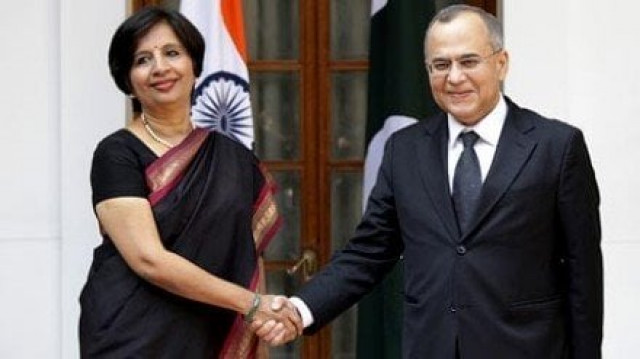Pakistan, India make ‘headway’ in Thimphu talks
Foreign secretaries of the two countries affirm the need to carry forward the dialogue process.

Pakistan, India make ‘headway’ in Thimphu talks
Putting behind the bitter experience of last July, India and Pakistan on Sunday night appeared to have made headway in bringing on track the stalled dialogue process as they agreed to carry it forward to resolve all outstanding issues in a constructive and forward-looking manner, the Press Trust of India (PTI) said.
India had called off a slow-moving peace process with Pakistan, called the composite dialogue, in 2008 after gunmen mounted commando-style attacks on landmarks in India.
According to the PTI, Foreign Secretary Nirupama Rao and her Pakistani counterpart Salman Bashir, who met in Thimphu for about 90 minutes, agreed that positive and cordial relations were in mutual interest of both the countries and they needed to work in this direction.
This is the first time since July last year that top diplomats of India and Pakistan are meeting to discuss key issues.
A joint press statement issued by both sides said that the two foreign secretaries had met in pursuance of the mandate given by their prime ministers following their meeting in Thimphu in April 2010 and the meeting of the foreign ministers in July last year in Islamabad and carry that process forward. “The foreign secretaries had useful and frank discussions on the steps required to be taken in this context,” Vishnu Prakash, the spokesperson for the ministry of the external affairs, said while reading out the statement to the media.
“They agreed on the need for a constructive dialogue between India and Pakistan to resolve all outstanding issues. They affirmed the need to carry forward the dialogue process,” he said, adding they would now brief their respective governments on their discussions.
During their talks in Thimphu on the sidelines of the SAARC summit last April, Prime Minister Yousaf Raza Gilani and his Indian counterpart Manmohan Singh had agreed that the foreign ministers and foreign secretaries would work to reduce the trust deficit plaguing the relationship.
Sources said Rao and Bashir, who held an informal meeting on Saturday night in the runup to Sunday night’s talks, had agreed that the dialogue process should be carried forward in a forward-looking manner.
At the meeting, the Indian side maintained that it was open to discussing all issues in a conducive atmosphere, they said.
The next milestone after Sunday’s talks will be the visit of Pakistan Foreign Minister Shah Mahmood Qureshi to India this year, dates for which will be worked out.
Rao and Bashir said separately that they would endeavour to find a way forward for continued engagement between the two countries.
“We are resuming our contact after an interregnum of some time. We have a number of issues to be discussed. As we have always said, the dialogue between India and Pakistan is necessary and a must if we are to satisfactorily resolve the outstanding issues between our two countries,” Rao said.
“We have a number of outstanding issues. So, we are going into this with an open mind and constructive attitude,” she said.
Bashir, on his part, said that his country is seeking constructive engagement with India. In an interview before the talks, he said the two countries needed to take incremental steps to reach the goals that they have set.
Published in The Express Tribune, February 7th, 2011.



















COMMENTS
Comments are moderated and generally will be posted if they are on-topic and not abusive.
For more information, please see our Comments FAQ